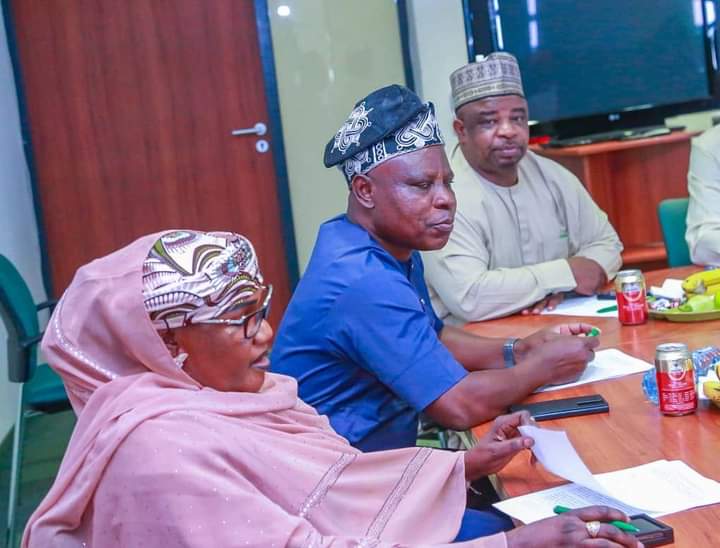The Committee on Customs and Excise of the House of Representatives has been inaugurated, with the Chairman, Hon. Leke Abejide, reeling out the items on the agenda of the committee in the next three and a half years.
Hon. Abejide, in his address at the inaugural meeting of the committee on Wednesday, December 6, 2023, highlighted the key areas of focus for the committee in line with Order 20 Rule 28 of the Standing Orders of the House of Representatives (10th Edition).
The chairman said the seven-point agenda includes oversight of the Nigeria Customs Service’s implementation of the new NCS Act 2023, revenue collection and remittance by the Customs, cost of collection deducted by the NCS, Export Processing Zones, training institutions, customs and excise laws, and budget estimates of the Customs.
Hon. Abejide said: “As we embark on this new chapter, I want to assure you that the Committee on Customs and Excise will be steadfast in its pursuit of excellence. We will work tirelessly to enhance trade facilitation policies, modernise customs procedures, and foster a conducive environment for economic growth and development.
“We are fortunate to inherit the legacy of the 9th Assembly, incidentally of which I was chairman of the same committee and the sponsor of the bill, which successfully repealed the 63-year-old Customs and Excise Management Act, Cap. C45, Laws of the Federation of Nigeria, 2004 (CEMA) and re-enacted the new Nigeria Customs Service Act 2023. This groundbreaking legislation represents a significant milestone in our efforts to streamline customs procedures, enhance trade facilitation, improve revenue generation, and promote economic growth.”
He added: “Under the new Act, the NCS now has access to increased revenue via a new financing model of 4% Free on Board (FOB), thus enabling it to operate more effectively and efficiently. The new Act also introduces a robust e-commerce system, aligning the NCS with global digital trends and promoting rapid revenue generation and ease of doing business.
“Another notable milestone of the Act is the establishment of a clear leadership structure for the Nigeria Customs Service. This is achieved by enabling a career officer, at least at the rank of Assistant Comptroller General, as the Comptroller-General of Customs to be appointed by the President of Nigeria. This stands in contrast to the previous Act, which lacked clarity on leadership, resulting in such appointments from the civilian and military backgrounds in the past.”
On the oversight of the NCS’ implementation of the new Act, Hon. Abejide said the committee would closely monitor the Customs’s progress in implementing the Act, ensuring that it adheres to the principles of transparency, accountability, and efficiency.
Speaking about revenue collection and remittance, the chairman said the committee would closely scrutinise the NCS’ the two items to ensure that all customs duties and levies are promptly accounted for and remitted into the Federation Account.
On the cost of collection, Hon. Abejide said the committee would continue to review the NCS’ cost of collection to ensure that it is reasonable and justifiable.
“It is worth mentioning that the new Act introduces a more streamlined and revenue-enhancing approach. Instead of the previously imposed 7% surcharge on duty payable, the Act now mandates a 4% Free on Board (FOB) charge. This change ensures that waivers granted do not adversely impact the revenue collection targets of the NCS, leading to a projected threefold increase in income compared to the current levels,” he said.
The chairman also said the committee would assume oversight of the Customs’ enforcement of regulations in Export Processing Zones (EPZs) to verify compliance with legal requirements and their contributions to economic growth. In collaboration with the Excise Department of the NCS, Hon Abejide said the committee would strive to ensure automation of production lines from raw materials intake to final product output, to block leakages and eradicate corruption.
Concerning training institutions, he said the lawmakers would assess the quality of training provided by the Customs’ training institutions to ensure that the NCS personnel are equipped with the necessary skills and knowledge to perform their duties effectively. “Committee members too shall participate in training to acquaint themselves with Customs laws, not only in Nigeria but also in other climes,” he added.
Hon. Abejide also said the committee would conduct periodic reviews of customs and excise laws to ensure that they remain relevant and effective in the face of changing economic and technological landscapes.
The chairman also said the committee would “meticulously” review the Customs’ annual budget proposals to ensure that they align with the government’s comprehensive economic and fiscal policies. He noted that the NCS’ budget is self-funding, “meaning it operates independently of the national annual budget to optimise its operations and efficiency.” According to him, this independent financial structure enables the Customs to effectively carry out its mandate and contribute to the nation’s economic growth.
He said: “In the face of ever-evolving trade patterns and technological advancements, our committee shall remain vigilant in addressing the challenges that lie ahead. We must strive to balance the need for revenue collection with the facilitation of legitimate trade, while also ensuring that our borders remain impenetrable to illicit goods and activities. I hereby crave the need for effective teamwork and collaboration.”
For the benefit of the first-timers in the committee, the chairman explained the hierarchical and operational structures of the NCS to the members, noting that Zone A of the Customs, which covers the South-West states, generates the highest revenue for the country.
Several members congratulated Hon. Abejide on his reappointment as chairman of the committee, while expressing their readiness to work with him as a team to deliver on their mandates.
Peoplesmind


